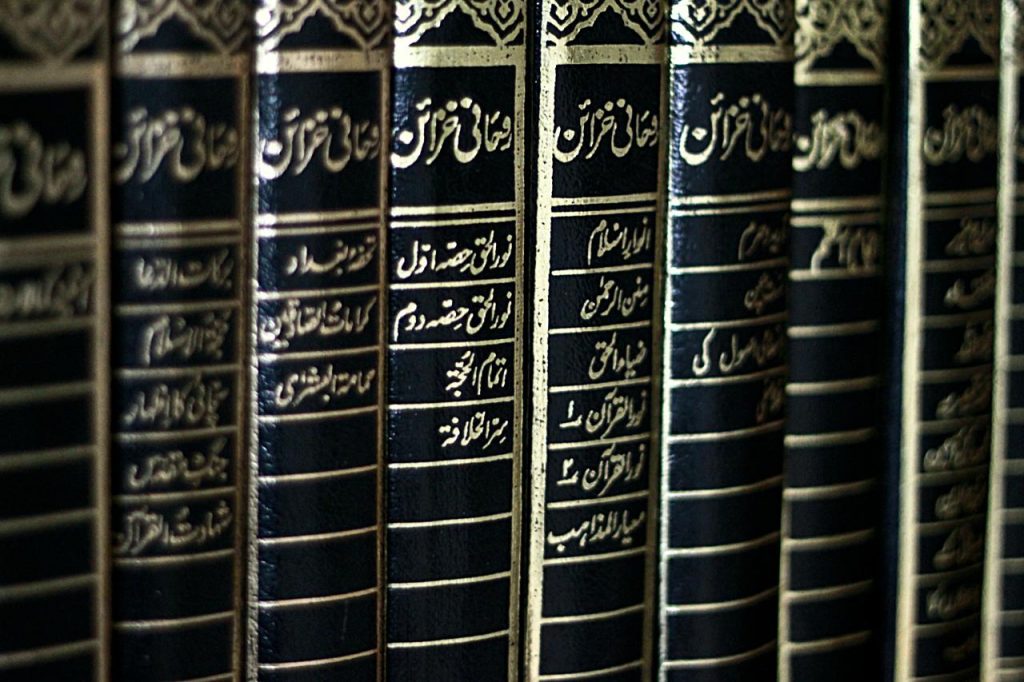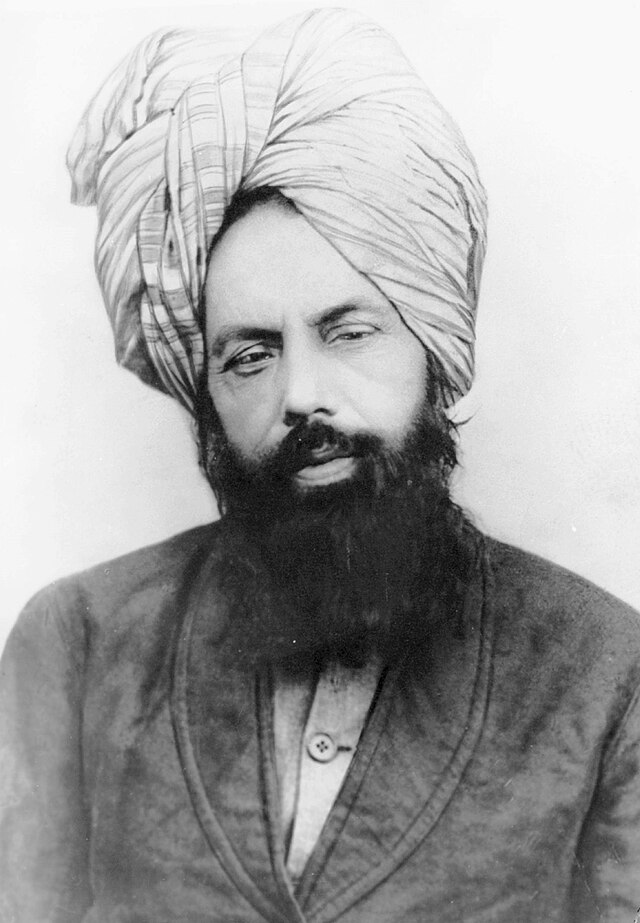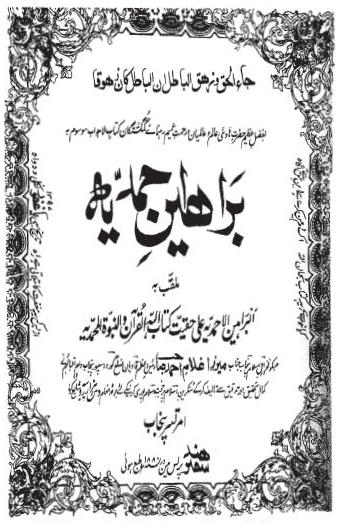
In the annals of spiritual history, the Promised Messiah (peace be upon him) emerged as a beacon of divine light, unveiling numerous wonders of the spiritual realm. Among these marvels, a series of challenges issued by him stand as a testament to his unparalleled resolve and conviction. This article delves into the realm of these challenges, which resonate across both scientific and spiritual domains, offering rewards as prophesied by the Holy Prophet Muhammad (peace and blessings of Allah be upon him), indicating that while the Mahdi would distribute wealth, none would accept it.
Throughout this discourse, I will delve into the profound implications of these challenges, touching upon their significance in the context of the Promised Messiah’s (peace be upon him) divine mission. While I will provide an overview of some of these challenges, it is important to note that this article will only offer a glimpse into the depth and breadth of the Promised Messiah’s (peas be upon him)visionary call. Through meticulous analysis and compelling narratives, I will aim to shed light on the enduring legacy of these challenges, serving as a source of inspiration and enlightenment for believers and seekers alike.
Challenge of 1,000 rupees to prove Hazrat Isa (peace be upon him) is still alive
The Promised Messiah (peace be upon him) states:
“Those who believe that Hazrat Isa Masih ascended to heaven with his physical body and will descend with his physical body are gravely mistaken. Remember that this notion is entirely baseless. There is no mention of it in the hadith literature. If anyone can prove from the hadith of the Messenger of Allah, peace be upon him, that Hazrat Isa ascended to heaven with his physical body and will descend from heaven with his physical body at some point, and both ascending and descending with the physical body can be proven from any hadith, then I swear by Allah, I will reward the presenter of such authentic hadith with a thousand rupees.”
(Majmu’ah Ishtiharat, vol. 1, p. 318, footnote)
Challenge of 20,000 rupees
Before the Promised Messiah (peace be upon him) issued this statement, he challenged individuals to present any authentic Hadith supporting the belief that Jesus was raised alive with his physical body and will descend again with his physical body. However, following his initial challenge, he extended it further, inviting anyone to bring forth even a Hadith with a weak chain of narrations that mentions Jesus’s (peace be upon him) ascent and eventual descent with his physical body.
He states:
“The gist of it is that those who adopt this belief have directly opposed the Quran in four ways. And if asked for proof that Hazrat Isa, peace be upon him, ascended to heaven with his physical body, neither can they present any Quranic verse nor can any Hadith be produced. They merely deceive the common people by adding the term ‘heaven’ alongside the word ‘descent’ (نزول). However, it’s important to note that the term ‘heaven’ is not found in any continuous chain of narrations (muttasil hadith), and the term ‘descent’ (نزول) is used in Arabic for travelers, referring to their arrival, while the term (نزيل) is for a traveler. The same expression is used in our country as well when, as a matter of courtesy, we inquire about the arrival of someone in a city by asking, ‘آپ کہاں اترے ہیں Where did you descend?’ And in this colloquial exchange, no one assumes that the person descended from the sky. If you search the hadith collections of all Islamic sects, you will not find a single authentic hadith or even fabricated hadith stating that Hazrat Isa ascended to heaven with his physical body and will return to earth at some point with his physical body. If anyone presents such a hadith, I am willing to reward them up to twenty thousand rupees, along with repentance and the burning of all my books, as they see fit.”
(Kitab al-Barriyah, Ruhani Khaza’in, vol. 13, pp. 225-226)

Linguistic Debate on Specific Terms
After issuing several open challenges to present any hadith or Quranic verses, the Promised Messiah (peace be upon him) delved even deeper by challenging the interpretations of certain Arabic words commonly used by non-Ahmadis to assert the continued existence of Hazrat Isa (peace be upon him).
1000 rupees regarding word خَلَتْ
To establish the death of Hazrat Isa (peace be upon him), the Promised Messiah (peace be upon him) referenced a verse from Surah Aal-e-Imran:
وَمَا مُحَمَّدٌ إِلَّا رَسُولٌ قَدْ خَلَتْ مِنْ قَبْلِهِ الرُّسُلُ
In response, Maulana Abdul Haq Ghaznawi argued that this verse merely indicates passing away, suggesting that Jesus came into the world and then went to heaven, which, according to him, is also encompassed by the meaning of the word “Khalat.” (خَلتْ)
In light of this interpretation, the Promised Messiah (peace be upon him) issued a challenge: He called upon anyone to present a Quranic verse, a Hadith, or any Arabic saying in which the word “Khalat” is used to describe someone ascending to heaven with their physical body.
He states:
“I am prepared to give you a reward of a thousand rupees if you can prove through any Quranic verse or any Hadith, strong or weak, fabricated or genuine, or any statement of the Companions or any other imam, or the sermons of Jahiliyyah, or the writings of both aversions, or any kind of poetry by Islamic poets, that the meanings of ‘Khalt’ also encompass the concept that someone with a physical body ascends to heaven. Allah Almighty, in the Quran, initially mentions ‘Khalt’ and then, according to the principles of eloquence and interpretation, expresses in such a way that only dying or being killed is stated. Isn’t this a decisive argument for the believer that there are only two meanings of ‘Khalt’ in this context, namely dying or being killed? After Allah’s testimony, whose testimony else is needed? Praise be to Allah, then to Allah again, for in such a situation, Allah Almighty has provided testimony for my truth and has stated that the meanings of ‘Khalt’ are dying or being killed.”
(Tuhfa Ghaznawiyya, Ruhani Khaza’in, vol. 15, p. 576)
The Challenge of a Thousand Rupees for Proving the Use of the Word ‘Tawaffa’ in the Sense of Death and Demise
In asserting the death of Jesus Christ (peace be upon him), the Promised Messiah (peace be upon him) also presented the point that Allah Almighty has used the word ‘tawaffa’ to indicate the demise of Jesus (peace be upon him). This word implies that his demise occurred naturally. This purpose could not be fully achieved through the use of the words ‘death’ and ‘demise’ because the term ‘death’ has multiple meanings. Therefore, the word ‘tawaffa’ was not used in place of death. To establish this, the Promised Messiah (peace be upon him) incessantly issued a challenge of a thousand rupees.
“The word ‘death’ has various meanings, encompassing sleep, unconsciousness, disbelief, misguidance, and nearness to death. If someone can show the use of the word ‘tawaffa’ in such contexts, they will also be eligible for an uninterrupted reward of a thousand rupees.”
(Izala-e-Auham, Ruhani Khazaʼin, vol. 3, p. 405)
Proving the Use of the Word ‘Tawaffa’ not in the Sense of Death
Among the other Quranic verses that establish the demise of Jesus Christ, two are as follows:
يَا عِيسَى إِنِّي مُتَوَفِّيكَ وَ رَافِعُكَ إِلَيَّ
(Surah Aal-e-Imran: 65)
فَلَمَّا تَوَفَّيْتَنِي كُنْتَ أَنْتَ الرَّقِيبَ عَلَيْهِم
(Surah Al-Ma’idah: 118)
In both the above verses, the terms “mutawaffika” and “tawaffaytani” are derived from the root word ‘tawaffa,’ which, in the context of Arabic grammar and linguistic usage, carries the meaning of death. Based on this meaning, Allah Almighty has chosen derivatives of the word ‘tawaffa’ in both of the mentioned verses. However, some proponents of the survival of Jesusas interpret both instances not as death but as a complete ascension of Jesus (peace be upon him) with his physical body to heaven. This interpretation contradicts the linguistic and contextual integrity of Arabic language usage.
In light of this, the Promised Messiah (peace be upon him), in his book “Izala-e-Auham,” has set forth a compelling challenge regarding the interpretations of ‘mutawaffika’ and ‘tawaffaytani.’
This challenge, reiterated across his literary legacy, notably in “Barahin-e-Ahmadiyya: Part 5,” underscores the significance of the term ‘tawaffa.’ Additionally, it finds mention in ‘Hamamatul Bushra” (Ruhani Khaza’in, vol. 7, page 724) and ‘Tiryaq-ul-Quloob’ (Ruhani Khaza’in, vol. 15, p. 458), among other publications, including Ishtiharat.
He states :
“Through the word ’مُتَوَفِّيكَ’ [mutawaffika], God testified that ‘Isaas died a natural death, but He did not stop there. He then explained the true meaning of the word ’مُتَوَفِّيكَ’ [mutawaffika]—i.e. to die a natural death— through the verse َوَمَا قَتُلْوُہ وَمَا صَلُبْوُہ [they neither killed nor crucified him] and the verse وَمَا قَتُلْوُہ يَقِيْناً [‘and they were not certain that they had killed him’]. For, when someone has died without any external causes such as murder etc., it will be understood concerning him that he has died a َوَمَا قَتُلْوُہ وَمَا صَلُبْوُہ natural death. Thus, there is no doubt that the statement [‘and they neither killed nor crucified him’] has come as explanation for the word ’مُتَوَفِّيكَ’ [mutawaffika—‘will cause you to die a natural death’]. And once absence of killing and crucifixion has been proven, then, in accordance with the maxim, ‘When the premise is falsified, the conclusion is also falsified’, it stands proven that the exaltation of Hazrat ‘Isaas was spiritual; and that is what we had set out to prove.
I will now return to the earlier discussion. It is an established fact that wherever the word توّفی [tawaffi] is used in a statement, wherein God is the fa‘il [subject] and some person specified by name is the maf‘ul bihi [object], such a sentence always means that God has caused that person to die or will cause him to die. It can have no other meaning at all. A long time has elapsed since I published an announcement regarding this established fact and challenged that if anyone produced, contrary to the above, any statement from ahadith توّفی or from authentic collections of Arabic poetry where the word [tawaffi] is used, and where God is the subject and a proper noun is the object—i.e. someone who has been identified by name is the object—and yet it does not mean ‘causing to die’, I shall give a reward of this much amount to such a person. No one has answered this challenge to this day.
Now, in order to bring home this argument, I once again publicly offer 200 rupees that if any of my opponents does not consider this statement of mine to be convincing and conclusive, he should produce just one sentence from authentic ahadith of the Prophet (peace and blessings of Allah be upon him), or from the works of ancient Arab poets—who are considered an authority and who are Arabic-speaking and who are established masters in their art— in which the word توّفی [tawaffi] is used where the subject is God and the object is a proper noun like Zaid or Bakr or Khalid, and yet the sentence clearly means something else and does not mean ‘causing to die’. In that case, I will award such a one with 200 rupees in cash. Such a person will only have to prove that the hadith he presents is indeed an authentic hadith of the Holy Prophet (peace and blessings of Allah be upon him), or that it is the statement of a poet from the ancient Arab poets whose mastery over the science of Arabic idioms is established.
It will be necessary to provide evidence that the hadith or the couplet does in fact conclusively bear a meaning that is in conflict with my assertion; and that the meaning becomes perverted if the definition that I deduce is applied. In other words, that hadith or that couplet should irrefutably signify the other meaning. For, if that hadith or couplet allows the possibility of the meaning that I render, then such a hadith or couplet is not worth presenting at all, since for it to be presented as precedence, it is essential that the contrary meaning should be irrefutable. The reason being that when it has been proven from hundreds of irrefutable examples that the word توفی [tawaffi]—in the setting wherein God is its subject, and a proper noun, i.e. a human being specified by name, is its object—cannot have any meaning other than ‘causing that person to die a natural death’, the onus is upon the one who makes a claim contrary to such numerous and consistent examples to produce a clear example that is irrefutable.”
(Barahin-e-Ahmadiyya: Part Five, p. 510, English trans.)
Clarification on Translation Discrepancies in Barahin-e-Ahmadiyya
In response to the challenge of the Promised Messiahas, it is presented as an objection that in Barahin-e-Ahmadiyya, Ruhani Khaza’in, vol. 1, p. 420, the translation of “مُتَوَفِّيكَ” (mutawaffika) has been given as follows:
”میں تجھ کو پوری نعمت دوں گا اور اپنی طرف اٹھالوں گا“
“I will grant you full reward and shall raise you towards Myself.”
Response:
This translation is not a valid objection, as on page 465 and 646 of the same Barahin-e-Ahmadiyya, the translation of the same verse is as follows:
”اے عیسی میں تجھے کامل اجر بخشوں گا یا وفات دوں گا ۔“
“O Isa, I will give you a complete reward or will cause you to die.”
In this context, the Promised Messiah (peace be upon him) himself has stated: “It should be remembered that the translation of divine words in Barahin-e-Ahmadiyya is, in some places, summarized and, in others, a word of similar meaning is used, but it is only what appears to be correct. It should not bother readers.”
(Barahin-e-Ahmadiyya: Part Five, Ruhani Khaza’in, vol. 21, p. 93)
Similarly, he stated elsewhere: “I have, by mistake, given the complete meaning of ‘tawaffi’ in Barahin-e-Ahmadiyya at one place, which some maulvis present as an objection, but this is not a matter of objection. I am human, and human shortcomings such as forgetfulness, error, and oversight are inherent in me, just as they are in all humans. I know that God does not hold me accountable for any mistakes, but to claim that I cannot make a mistake in my interpretation is incorrect. Divine inspiration is free from error, but human speech is susceptible to error, as forgetfulness is a necessary aspect of humanity.”
(Ayyam-e-Sulh, Ruhani Khaza’in, vol. 4, pp. 271-272)
This fact has also been elucidated by the Holy Prophet (peace and blessings of Allah be upon him):
مَا حَدَّثْتُكُمْ عَنِ اللهِ سُبْحَانَهُ فَهُوَ حَقٌّ وَمَا قُلْتُ فِيْهِ مِنْ قِبَلِ نَفْسِي فَإِنَّمَا أَنَا بَشَرٌ أُخْطِئُ وَأصِيبُ
“Whatever I tell you from Allah, it is true. (Meaning there is no possibility of error in it) But what I say of myself, bear in mind that I am a human, and I can also err.”
إِنَّمَا أَنَا بَشَرٌ انْسَى كَمَا تَنْسَوْنَ
(صحيح البخاری، کتاب الصلوة باب التوحيد نحو القبلة حيث كان)
“I am also a human being. Like you, I also forget.”
So, it is not possible to present an objection against the translation of ‘tawaffi’ in Barahin-e-Ahmadiyya.

Challenge of Writing a Response to Barahin-e-Ahmadiyya
The first part of this book was published in 1880. In this section, the Promised Messiah (peace be upon him) challenged the leaders of the world’s religions, stating that if any non-Muslim could present a proof of the truth of the Qur’an and the authenticity of the Prophet Muhammad (peace and blessings of Allah be upon him) equal to half, a third, a quarter, or a fifth of the evidence we have presented from our own book, the Qur’an, regarding the truth of their religious beliefs, or if they were unable to present evidence, then they should refute our evidence numerically, then I unconditionally pledge to offer my ten thousand rupees estate as a reward.
He challenges all opponents of Islam, whether they be followers of other religions or sects, who deny the truth of the Qur’an and the prophethood of Hazrat Muhammad Mustafa (peace and blessings of Allah be upon him), to come forward with a publication affirming the veracity of their religion’s beliefs and the truthfulness of the mission of Hazrat Khatam Al-Anbiya (the Seal of the Prophets) Muhammad Mustafa (peace and blessings of Allah be upon him), drawn entirely from their own divine scripture, the Qur’an, and composed in their own inspired writing. Or if they cannot produce an equal number, then they should produce half, a third, a quarter, or a fifth of that evidence. If they are unable to present evidence, then they should numerically refute our evidence. In all these cases, provided that three impartial and accepted judges unanimously express their opinion that the condition was fulfilled as it should have been, I, without any objection, will hand over my valuable estate worth ten thousand rupees.
(Majmua Ishtiharat, vol. 1, p. 72-73)
Implementation of Barahin-e-Ahmadiyya Challenge
In response to this challenge, some opponents of Islam published enthusiastic announcements of their intent to write a response. Upon which, he immediately wrote:
“All gentlemen are requested not to hesitate at our challenge. Become like Plato, shine like Bacon, adopt the views of Aristotle, and think over. Raise your hands to implore your artificial gods, then behold, whether our God, the Conqueror, comes to us or your false gods.”
(Barahin-e-Ahmadiyya: Part Two, pp. 56-57)
At that time, it was the duty of Arya Samajis, Christens and Brahmo Samajis to publish a book in response to this challenge. However, Swami Dayanand Saraswati, who later became your opponent and put his stamp on the defeat of Arya Dharma forever, also published a book under the title “Takzib Barahin-e-Ahmadiyya.” Those who have had the opportunity to see the writings of the mentioned Swami know well that there was nothing in this writing except insults, ridicule, and frivolities. This book, as its name suggests, was just a collection of such nonsensical things, but it was also not left unanswered. Unfortunately, none of the Arya Samajists paid attention to this challenge, which resulted in Muslims who were influenced by the regular Arya Samaj gradually withdrawing, and even Muslims who entered the regular Arya Samaj gradually left it.
Challenge of Writing a Response to Tuhfa-e-Golarwiyyah 50,000
Hazrat Mirza Ghulam Ahmad, the Promised Messiah (peace be upon him), authored this book in 1900 with the intention of completing the argumentation against Peer Mehr Ali Shah Golarwhi, his disciples, and other like-minded individuals. In this book, he provided compelling evidence for the truth of his claim and substantiated from Quranic verses and Hadiths that the advent of the Promised Messiah was necessary within the Muslim community, and that this was indeed the era of his advent, in which Allah had appointed him as the Messiah. He also promised a reward of fifty thousand rupees to the one who can refute this book.
This formidable challenge extended beyond mere theological debate; it also encompassed literary endeavors. Promised Messiah (peace be upon him), in his wisdom, extended invitations to vie with him in Arabic literature, Qur’anic exegesis, and other scholarly pursuits. The names and corresponding prize money of a few are as follows:
Surmah Chashm-e-Aryah – Compare Vedas with Quran – 500 rupees
Ijazul-Masih – Arabic Qaseeda – take help from anyone you desire – 10,000 rupees
Karamatus-Sadiqin – Arabic Tafsir of Surah Fatiha & 4 Arabic odes – 1,000 rupees and 5 rupees per Arabic mistake if they can find any
Nurul-Haqq – to ex-Muslim Priests who said they left Islam because they know Arabic; Write an Arabic book similar to this – 5,000 rupees
In the scope of an article, it is regrettably impossible to delve into each challenge in exhaustive detail. Yet, it remains a testament to the intellectual rigor and unwavering commitment of the Promised Messiah (peace be upon him) to engage in scholarly discourse and defend the truth of Islam.



